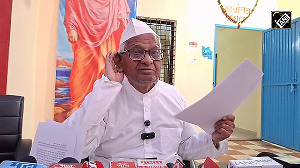Officials said Dr Rice would visit India on Wednesday, following her meeting with NATO leaders in Brussels on Tuesday. It was likely that Admiral Mike Mullen, chairman of the US Joint Chiefs of Staff, would also travel to Pakistan at about the same time for discussions with Pakistani civilian and military leaders to pressure them into turning their words into action is clamping down and destroying any terrorist training camps in Pakistani territory.
Bush's decision to dispatch Dr Rice following his second call to Dr Singh coincided with concern being expressed by senior US lawmakers over the rising India-Pakistan tensions and Pakistan's Ambassador to the US, Husain Haqqani saying that 'if there is any troop build-up on our eastern border, we will certainly have to take defensive positions, and unfortunately that may mean bringing troops from the Western border.'
Senator Richard Lugar, the much respected ranking Republican on the Senate Foreign Relations Committee, appearing on ABC's This Week, said, 'We are going to have to move very rapidly ourselves -- that is the United States of America -- to make certain that our forces in Afghanistan, quite apart from what we are doing in Iraq, are protected, while the rest of this goes on with two very high level countries.'
Another senior and influential Republican lawmaker, Senator Arlen Specter, said, 'The tensions are high and the consequences could be disastrous.'
He told CNN's Late Edition, 'You have two major nations with nuclear weapons -- there's been heavy tension in the past and anything could explode.'
'And,' Specter added, 'it's very important for the United States government to play the soothing role. Let's keep cool. Let's find out who's responsible and it's important that the Pakistani government has said, we are with you, India, and we will take action against any terrorist group.'
'But it's a critical difference to point out that it's a terrorist group in Pakistan,' he argued, taking Pakistan's denial of any official complicity in the terrorist attacks at face value. 'After all, the terrorists in Pakistan, assassinated Benazir Bhutto. And, when you have terrorists at work, it is not the work of the Pakistani government.'
Senator Robert Menendez, a Democrat on the Senate Foreign Relations Committee, agreed with Specter's contention that the US has to move quickly to calm the rising tensions between India and Pakistan, saying, 'This is one of these critical moments where the United States can play a role in making sure that both Pakistanis and Indians cool the present passion and we get to the facts so we can understand whether in fact it's simply elements in Pakistan that conducted these terrorist attacks.'
He said such a role by the US was also imperative so as to 'see the response of the Pakistani government, if that is established as they move against these elements and that produces good faith with the Indians.'
'What we don't need is a repeat of what happened several years ago when these nations sent troops to their respective borders and escalated... these are two nuclear nations that ultimately we cannot have in confrontation,' he said.
Menendez thus reiterated that 'it's an important moment for diplomacy as well. And, I am glad that our government has sent teams, particularly, the FBI to help the Indians so we can determine what the truth is.'
Another senior Republican Senator Lindsey Graham, also saying he was glad that the Pakistanis have assured India that it's ready to help with the investigation and work with India to get to the bottom of these attacks, said he hoped this could lead to new alliances in the region arrayed against such international terrorism.
'Out of this could come collaborations and partnerships we haven't seen before between Afghanistan, Pakistan and India,' he said, and hoped for a 'joint vision, strategic vision and tactical operations to go after terrorists that reside in the region.'





